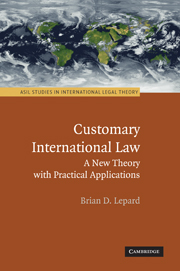Book contents
- Frontmatter
- Contents
- Figures
- Acknowledgments
- Cases
- PART ONE THE ENIGMAS OF CUSTOMARY INTERNATIONAL LAW
- PART TWO FOUNDATIONS OF A NEW THEORY OF CUSTOMARY INTERNATIONAL LAW
- PART THREE RESOLVING THE CONCEPTUAL ENIGMAS OF CUSTOMARY INTERNATIONAL LAW
- PART FOUR RESOLVING THE PRACTICAL ENIGMAS OF CUSTOMARY INTERNATIONAL LAW
- 12 General Sources of Evidence of Opinio Juris
- 13 The Role of Treaties as Evidence of Opinio Juris
- 14 The Role of United Nations General Assembly Resolutions as Evidence of Opinio Juris
- 15 The Role of Consistent State Practice
- 16 The Persistent Objector Exception
- 17 Defining Jus Cogens Customary Norms
- 18 Defining Erga Omnes Customary Norms
- 19 Resolving Conflicts with Treaties
- 20 Changing Customary International Law and the Role of International Organizations
- PART FIVE SOME APPLICATIONS OF THE THEORY
- PART SIX THE FUTURE OF CUSTOMARY INTERNATIONAL LAW
- Bibliography
- Index
12 - General Sources of Evidence of Opinio Juris
Published online by Cambridge University Press: 05 June 2012
- Frontmatter
- Contents
- Figures
- Acknowledgments
- Cases
- PART ONE THE ENIGMAS OF CUSTOMARY INTERNATIONAL LAW
- PART TWO FOUNDATIONS OF A NEW THEORY OF CUSTOMARY INTERNATIONAL LAW
- PART THREE RESOLVING THE CONCEPTUAL ENIGMAS OF CUSTOMARY INTERNATIONAL LAW
- PART FOUR RESOLVING THE PRACTICAL ENIGMAS OF CUSTOMARY INTERNATIONAL LAW
- 12 General Sources of Evidence of Opinio Juris
- 13 The Role of Treaties as Evidence of Opinio Juris
- 14 The Role of United Nations General Assembly Resolutions as Evidence of Opinio Juris
- 15 The Role of Consistent State Practice
- 16 The Persistent Objector Exception
- 17 Defining Jus Cogens Customary Norms
- 18 Defining Erga Omnes Customary Norms
- 19 Resolving Conflicts with Treaties
- 20 Changing Customary International Law and the Role of International Organizations
- PART FIVE SOME APPLICATIONS OF THE THEORY
- PART SIX THE FUTURE OF CUSTOMARY INTERNATIONAL LAW
- Bibliography
- Index
Summary
INTRODUCTION
The normative framework developed in earlier chapters can assist not only in unraveling the conceptual enigmas of customary international law, but also in resolving some of the practical enigmas identified in Part One. One practical enigma is what sources of evidence of opinio juris are appropriate to consider and how much weight particular sources should be given. In this chapter I explore this issue.
GENERAL PRINCIPLES
The interpretation of opinio juris previously proposed suggests that a number of types of evidence of the attitudes of states ought to be considered in assessing whether states generally believe it is now or in the near future desirable to institute a particular legal norm.
Of course, a state is not an individual and thus cannot, properly speaking, have “beliefs.” Thus, the requirement that “states generally believe” that a norm should be recognized as a legal norm cannot be fulfilled literally. Instead, states act and express views through a multiplicity of agents, including heads of state, heads of government, parliaments and their members, and national judicial bodies. Under international law, acts of these agents can normally be considered acts of the state. This principle is reflected in Article 4 of the Articles on State Responsibility adopted by the International Law Commission in 2001, which affirms:
The conduct of any State organ shall be considered an act of that State under international law, whether the organ exercises legislative, executive, judicial or any other functions, whatever position it holds in the organization of the State, and whatever its character as an organ of the central Government or of a territorial unit of the State.
[…]
- Type
- Chapter
- Information
- Customary International LawA New Theory with Practical Applications, pp. 171 - 190Publisher: Cambridge University PressPrint publication year: 2010



